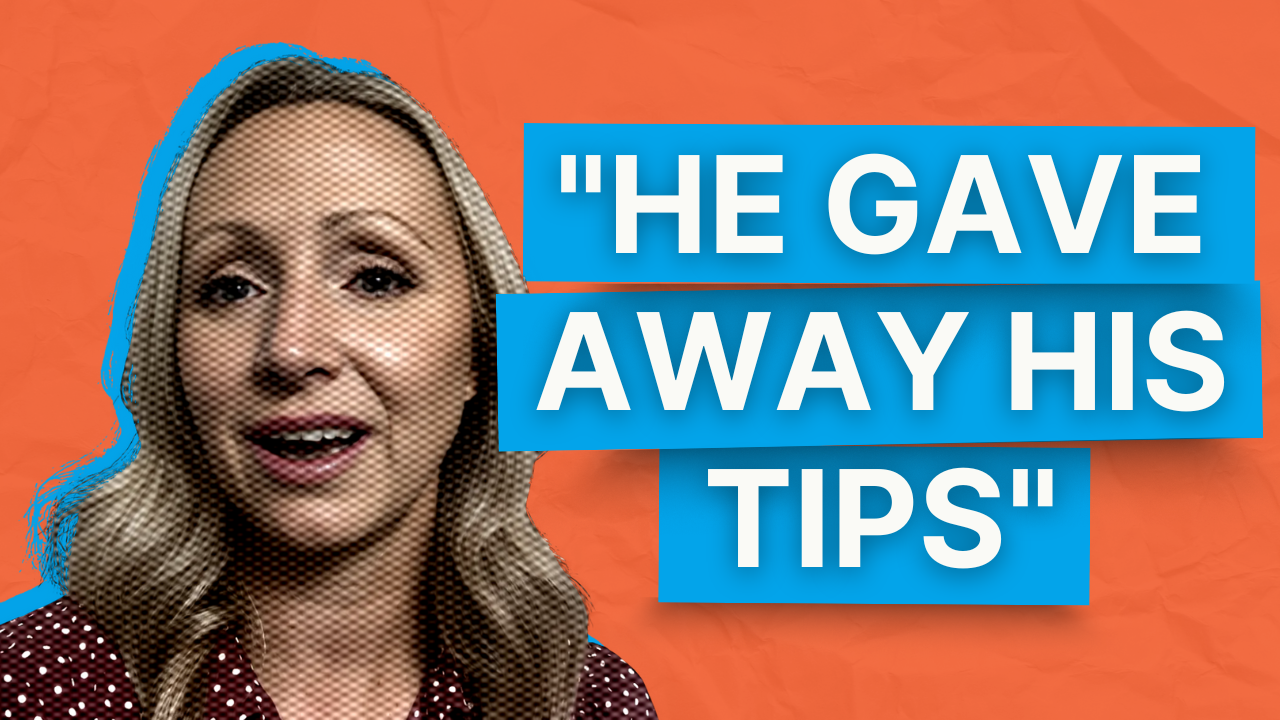.avif)
🎙️ Episode 001 - Students Aren't Standard
🎙️ Episode 001 - Students Aren't Standard
🎙️ Episode 001 - Students Aren't Standard
"It's not you, it's the curriculum."
– Matt Bowman
Matt Bowman is the ultimate education innovator.
In this inaugural episode of the OpenEd podcast, incoming CEO Isaac Morehouse speaks with Matt about the future of personalized education in the age of technology. They dive into Matt's personal journey from teacher to tech entrepreneur, and how his experience with his own five children led to the creation of OpenEd.
If you don't know him, Matt is the founder of OpenEd (formerly My Tech High), a platform that partners with schools to provide personalized, flexible education options for K-12 students. This is a must-listen if you're a parent, educator, or anyone interested in the future of education and how technology is changing what it means to learn.
Subscribe: Spotify • Apple Podcasts • YouTube
Learn:
- How personalized curriculum can transform a child's relationship with learning
- The importance of giving students choice in their educational journey
- How technology and entrepreneurship are reshaping education
- Why ages 10-14 – the forgotten years – are crucial for personalized learning
- Why entrepreneurship is the ultimate form of education
- Balancing technology and human connection in learning
Chapters:
00:00 - Introduction to the OpenEd Podcast
02:19 - Meet Matt: The Founder of OpenEd
03:09 - Matt's Early Life and Educational Background
07:58 - College and Career Decisions
15:45 - Bringing the Internet into the Classroom
19:03 - Isaac's Educational Journey
26:57 - Student-Inspired Alternative Signal
27:23 - The My Tech High Origin Story
30:13 - Navigating Educational Choices for Children
33:09 - Embracing Educational Flexibility
42:09 - The Birth of OpenEd
50:00 - Strategic Narrative and Future Vision
Transcript
Introduction and Podcast Theme
Isaac: Our core theme is that every individual is different, yet many educational approaches treat them as if they aren't. We believe all types of education should be on the table. We're exploring all approaches to education, whether in the classroom, out of the classroom, online, in person, one-on-one, or group setting. Our thesis is that every individual should have access to all these options to use when and where they make sense for them.
Matt: We really do embrace all forms of learning. It's open for all, and we need to figure out how to do that for everybody.
Matt's Background and Early Experiences in Education
Matt: I was born to educator parents. My mom was a high school teacher who taught tech and business, while my dad was an electrical engineering professor. We were always surrounded by technology and learning. At 17, I started my first education company—a backyard all-sports camp for neighborhood kids. It taught me the value of education and helping kids learn, both as a way to do good and as a business opportunity.
Isaac: Matt, you were also an exceptional basketball player in high school. How did sports fit in with your education?
Matt: My parents always encouraged me to be active and play sports. The things you learn in sports are applicable to the academic world. Interestingly, despite being an academic all-American, my lowest grade was in PE because I couldn't meet their long-distance running thresholds. This experience probably contributed to my belief that it's insane to judge someone on something that comes naturally to others but not to them. It highlighted the need for personalized approaches in education.
Matt's College Experience and Career Path
Matt: I got a scholarship offer from a junior college to play basketball. Our team ended up being seventh in the nation. In high school, I focused on scoring, but in college, I focused all my energy on defense and ended up getting a defensive player of the year award.
After a two-year church mission in Uruguay, I realized how enjoyable I found teaching. I decided to pursue a teaching career instead of continuing with basketball. I chose elementary education, inspired by my fourth-grade teacher who was a great influence.
I ended up getting my master's degree in education focused on the forgotten child from 10 to 14 years old. This middle level child became something I became passionate about. My own master's degree was focused on helping that middle school child from ages 10 to 14.
The Importance of Middle School Education (Ages 10-14)
Matt: You change most in your life between those ages, except zero to three. And you think of how much you change from birth to three years old. That's the changes going on between a 10 to 14 year old. I'd have parents show up and just say, "If you can do anything with my child, good luck," and walk out the school. We'd have just a great time. It was a great experience. And that's really where I fell in love with education for life.
Isaac: I have actually never come across that concept of that 10 to 14 window being so crucial. When I think about my own experience homeschooling my kids and being homeschooled, it's not uncommon that out-of-the-box approaches to education can work okay in very early years and high school years. But when you really feel that this out-of-the-box version of education is not fitting your child, it usually starts around that 10 to 14 age. That's when the real pain starts to come together.
Matt: One of the reasons standardized education doesn't work for the 10 to 14 year old is because these two kids are absolutely normal: one is 6’ 4” inches and one is 4’ 6” inches. They're statistically normal, but yet there's such a range. There are kids that are driving cars when other kids are still playing with cars. Same with dating and playing with dolls. They're all totally developmentally normal. How do you set a standardized system for that range of developmental differences? You just can't. So personalization is the essential step when children are changing that much.
Bringing the Internet into the Classroom (Mid-1990s)
Isaac: I remember you saying a couple of times that you started bringing the internet into the classroom in the mid-nineties. What prompted that?
Matt: I was a sixth grade teacher up in Washington state. The state announced a grant to any teacher who wanted to learn how to bring this new thing called the internet into their classroom. Most teachers grumbled at it. You can imagine just saying, "No, the internet. I don't want that in my room." It's almost like today we're saying people don't want phones in classrooms. It's the greatest educational access device you have, and we're saying, "Let's shut it off and remove it from kids."
I jumped at it. My classroom was filled with computers, all internet enabled. We started doing tech-based projects and I saw student engagement go off the charts. Because now when they did a project and I said, "We're going to share it with our sister school in Germany," the kids would spend after-school time making their project look even better. They would take so much time to get it right and make the animations look really good and the graphics look well. They were learning all these skills of edit, design, develop prototype, things that we dream of kids learning. The internet and project-based curriculum was able to help them do that.
Isaac's Personal Education Journey
Isaac: My story is in many ways very different from yours, but there's so much overlap. I grew up homeschooled in the early eighties when it was legally questionable in Michigan. My mom happened to be a certified teacher. We had a very vibrant homeschool community with sports teams and various activities.
When I was 14, I wanted to be with people my age all day long. I went to a small private school for my sophomore year of high school. There were things I loved about it, but after being homeschooled for so long and being really independent, I remember thinking, "Why are these 50-minute classes no matter how fast or slow I learn? What if I'm done in 10? What if it takes me two hours?"
So I went to community college full-time for my junior and senior year of high school. I actually loved community college as a high school experience because I had more control over my schedule. Although I did not feel that most of the classes were translating into getting a job someday.
In college, I realized I was learning so much on the job, working for a small business and getting paid to do it. And then I'm turning around and paying all of my money to go to classes, and no one wants to be there. When class was canceled, everyone would celebrate, including the professor. I thought, "What other good do you pay for in advance and then you're happy when it's not delivered?"
The Origin Story of My Tech High (now Open Ed)
Matt: Open Ed started when we realized our children all needed different educational approaches. We thought, "Other parents must need this too." So we decided to help families access world-class education at no cost to them by contracting with school districts or charter schools.
We started with 92 pioneer students, focusing on tech and entrepreneurship. When I asked parents about their favorite curriculum providers, we got 92 different answers. That's when I thought, "Could our model be 'choose your own adventure' for curriculum by subject, course, child, and grade level?" Instead of standardization, we decided to partner with every best curriculum provider out there.
Letting Children Choose Their Education Path
Isaac: Did it feel scary to let your kids choose their education path?
Matt: It was actually liberating. We provided guidance but wanted them to take ownership. Our oldest chose a charter school with his friend. Our third child later decided he preferred the district middle school. We realized it was okay to have kids in different schools, as long as it fit their needs.
The Flexibility of Education Rules and Norms
Isaac: Many people don't realize how flexible educational rules can be. I've seen this with job applications too - people assume a college degree requirement is set in stone, but it's often just a guideline.
Matt: Exactly. When my daughter finished her associate degree during high school, we asked if she could walk at graduation despite not following the traditional path. The school analyzed her achievements and agreed. It shows that many rules are just norms, not strict laws.
Isaac: This flexibility extends to many areas. I often tell people I don't have a high school diploma, and they're surprised. But I got a college degree and jobs - no one ever asked for my diploma. People often take rules for granted without questioning them.
The Value of Family Time in Education
Matt: Many parents tell me that choosing our program has brought them back to family dinner and enjoyable conversations in the evening. It used to be just riding them hard for homework, with kids slamming doors and exhaustion. Now, that relationship is so much stronger for child and parent.
Isaac: When COVID happened, many parents said, "I have gotten to see things about my kids that I never knew. I've gotten to have conversations with them. I've gotten to enjoy and appreciate them in ways that I didn't know were possible."
Even if they are in traditional school, there are often ways to say, "What if they had more time? What if I didn't push them so hard to do all these arbitrary things that aren't helping them, but are only causing stress. And we had more time together. How valuable is that?"
Real-World Learning Experiences
Isaac: I spent a lot of time with my grandparents when they were building a house. I didn't become a handyman, but I learned so much just watching my grandpa's decision-making process, negotiating with people, and even some lessons on what not to do, like his temper.
I think about that with my own kids. Imagine if they're up in their room just doing some "train went from Boston at 60 miles an hour" assignments all night long versus coming with me to Home Depot while my wife and I argue about which kind of tile we need in our kitchen. That's actually a really interesting experience. It's interpersonal communication, it's budgeting, it's cost-benefit analysis, it's trade-offs, it's how to get along with your spouse when you have a house project. These things are actually more important than doing one more story problem for the 10th time.
The Founding Principles of Open Ed
Matt: Open Ed started with seeing our children all needed something different. We imagine other parents have experienced a need for different options for their children too. That's really was the foundation of the start of My Tech High. Let's see if we can do this for other families that we have done for ourselves.
We didn't want to launch a private academy for wealthy families. They already have almost ultimate choice already. I wanted to really arm and enable low to middle-income families to have excellent choices in education also.
Isaac: And that entrepreneurial insight is what the company was founded on, and that's what it's still the core today. You go to these parents and 92 parents give you 92 different things when you say what's the best curriculum and your answer to that was "yes, let's do all of it."
This platform of, hey, we'll partner with a public or charter school. You can come in and kid by kid, you pick period by period what you're going to do. Maybe it's a course that we built. Maybe it's a course from another online provider. Maybe it's a local tutor in your area. Maybe it's something that you're doing yourself at home. Being able to just say whatever you need to build, you build it and we want to provide that platform and provide you with resources and give you access to some of these courses free of charge as much as possible and help you cover that.
The Importance of Curriculum Flexibility
Matt: Math is one of those things that many kids struggle with. When you offer them multiple curriculum options, you can say to the child, "It's not you. It's the curriculum." And for the first time, they say, "I'm not dumb. I'm not bad at math. It's just, I haven't found the curriculum that clicks with my brain yet."
When we try a different version, and then all of a sudden one clicks, the child's light bulbs go off. It's the curriculum, not the child. And math is one of those things that needs to embrace that, to not have kids blame themselves.
Isaac: That's so cool because it's typically in education, people are passionate about education, myself included. We come in with very strong points of view on what should be taught and how it should be taught. And that's okay. Like everyone has those. You have a strong point of view that entrepreneurship and tech need to get more focus than they get for most people. And that point of view comes into Open Ed a little bit, right? It's definitely emphasized somewhat.
But I love this idea of, "Hey, look, I don't want to fall prey to the fatal conceit that I know what's good for everybody. Yeah, maybe I have some opinions, but how about we create this platform where you can go and what you want to do for each kid at each time, go ahead. And we want to try to help facilitate that." That is the core of what we're doing.
Matt: Sometimes educators take on this doctorate of education standpoint, and they are diagnosing and prescribing like doctors do in healthcare. And that to me is backwards. Let's start with the child, and that leads to this other example of math. For the first time, they say, "Oh, you mean I'm not dumb. I'm not bad at math. It's just, I haven't found the curriculum that clicks with my brain yet."
Isaac: Oh, I love it. I love it. You're getting me really hyped. So I'm going to bring this around to a close. We are definitely going to have a round two with the two of us because we've kind of done a historical overview. There's so many things I'd like to pick your brain on.
Links
- Praxis (college alternative program)
Educational approaches mentioned:
- Montessori: Montessori Education
- Unschooling: Unschooling: How It Works
- World schooling: Worldschooling Central
- Homeschooling: Homeschool Legal Defense Association (HSLDA)
- Charter schools: National Alliance for Public Charter Schools
Subscribe to The OpenEd Daily
Join 17,000+ families receiving curated content to support personalized learning, every school day.
.webp)
.avif)


.png)
.png)
